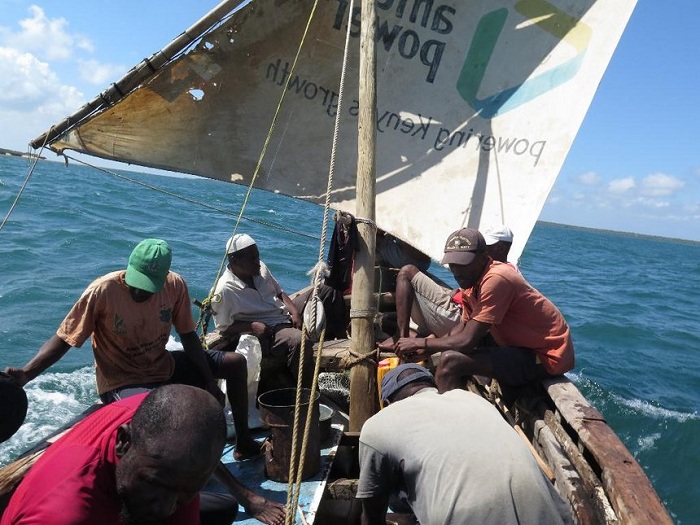![12. Flipflopi Launch [Flipflopi boatbuilders on the boat] - please credit Leonard Schurg](https://barakafm.org/wp-content/uploads/2019/01/12.-Flipflopi-Launch-Flipflopi-boatbuilders-on-the-boat-please-credit-Leonard-Schurg.jpg)
Mombasa,KENYA:A traditional dhow sailing boat made entirely from plastic trash collected from Kenya’s beaches and towns will arrive in Mombasa on 28th January as it makes its maiden voyage later this month from Lamu to Zanzibar – a 500-kilometer expedition stopping at communities along the way in a bid to change mindsets about plastic waste.
The FlipFlopi is a first-of-its-kind, 9-meter sailing boat made from 10 tonnes of discarded plastic.
The dhow was launched in late 2018 in Lamu during the world clean up day celebrations.
It was built by a team calling for a Plastic Revolution which aims to stem the flow of up to 12 million tons of plastic waste dumped into the world’s oceans each year and to highlight the potential for plastic waste to be re-used.
The expedition will start in Lamu on January 24 and it is expected to arrive in Kilifi on 27th January, Mombasa on 28th January, and Diani on 30th January.
The boat is expected to arrive in Stone Town in Zanzibar on February 7, where the Flipflop and Cleanseas teams will meet up with Conservation Music at the Busara Music Festival, engaging festival goers in the fight against marine plastic pollution through music and culture.
This comes as the country tightens the noose on the ban of secondary packaging plastic bags.
Only nine percent of the nine billion tonnes of plastic the world has ever produced has been recycled.
Conservationists have in the past warned that the overwhelming majority of plastics – including plastic drinking bottles, plastic bottle caps, food wrappers, plastic grocery bags, plastic lids, straws and stirrers, and foam takeaway containers – are designed to be thrown away after a single use, ultimately ending up in landfills and the environment.
In Africa, conservationists have warned that marine debris represents a potential threat to food security, economic development, and the viability of the marine ecosystems thus affecting over 12 million people on the continent engaged in fisheries.
During the Blue Economy Conference, hosted by Kenya last month, governments committed to protecting oceans, seas, lakes, and rivers.
The FlipFlopi-Clean Seas Expedition comes a month before the next UN Environment Assembly in which more than 150 ministers of environment will gather in Nairobi.












